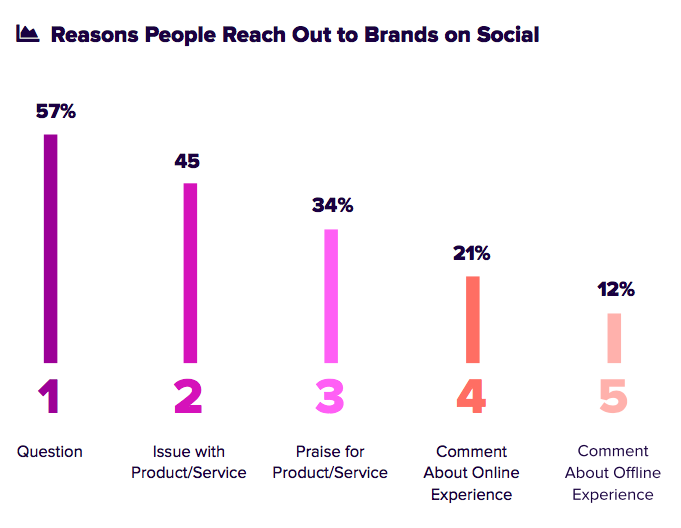 Social media is one of the first channels consumers head to when they have a question or an issue. In fact, 45% of consumers have done this. A recent Sprout Social study sited the disconnects between social marketers’ goals and consumer preferences, and there is one area they found that marketers and consumers agree cannot be left out of the mix: customer service.
Social media is one of the first channels consumers head to when they have a question or an issue. In fact, 45% of consumers have done this. A recent Sprout Social study sited the disconnects between social marketers’ goals and consumer preferences, and there is one area they found that marketers and consumers agree cannot be left out of the mix: customer service.
On the front lines with customers and prospects everyday, an overwhelming majority (88%) of social marketers understand the importance of customer service on social; nearly half (45%) of consumer respondents have reached out to a company on social.
Social media is a unique customer service channel.
Handling customer service through social media is tricky. The same marketing individual or team is often expected to wear the customer service hat, and can quickly go awry when specific skills and focus are absent.
Given that many customer messages go unanswered on social media, it’s clear that brands haven’t put enough attention on designating someone to oversee their digital reputation. In many cases, customer care is left to a group of busy people who view it as an afterthought.
Great social media customer service has a strong impact on a business’ bottom line.
Social customer care doesn’t just contribute to brand perception, it impacts your bottom line: 21% of consumers are more likely to buy from brands they can reach on social. The same percentage would rather message a brand on social media than call customer service. This tells us that social customer service has a financial impact and is swiftly becoming the consumer’s preferred care channel.
Done well, social customer care means customers will spend more, it improves efficiency and it generates data that you can use to improve services and benchmark against your competitors. Done poorly, and you will be faced with spending precious resources digging your brand out of a hole.
Research published in Harvard Business Review found that customers who received a response to their query on social media were more likely not just to remain a customer, but to spend more money with the brand, and recommend it to others. The research from Sprout Social shows that answering a customer’s question on social media prompts 49% of consumers to purchase.
A rapid response is now standard.
Facebook Messenger, already widely used for customer service, is setting the standard for response times on social media.
48% of those surveyed valued a quick response on social media above any other action a brand could take.
Brands have a lot of work to do to meet these expectations. According to Sprout Social, the average brand response rate is just 12%. On average, a response takes 11 hours. That’s far short of the Facebook-recommended 15 minutes, and a lot of potential sales lost.
The top reasons that consumers reach out to brands on social are:
- They had a question (57%)
- They had an issue with a product or service (45%)
- They wanted to commend a company on their product or service (34%).
When a customer reaches out with a question (their #1 reason for reaching out on social) use this as an opportunity to form a relationship—not just resolve an issue.

There is a wide range for how many customer service requests a brand receives via social, though 58% of marketers surveyed receive between 1-50 requests in a week.
There is also a wide range in response times, though the majority (78%) respond to a customer request within 12 hours.
Social has matured as a communication channel and consumers have blended it into their lives. They expect brands to do the same.
While many businesses now use social media regularly, very few take social customer service seriously.
Quality customer service – regardless of channel – relies on a meaningful, efficient, solution-focused exchange between businesses and their customers. The consumer preference for social media as a communication channel requires your organization to re-think its customer service policies and procedures, and integrate them with your business plan and marketing strategy.
The best social customer service keeps your brand in the conversation and doesn’t allow malcontents and competitors to speak for you.
All this data makes it crystal clear how important social customer care is to your social and overall business strategy. How can brands and social marketers actually improve their efficiency and strategy in this area? More than half of social marketers say the answer is a bigger team.
Large, small or somewhere in between, a business must allocate the right resources into social media. Given the data, it’s clear that customer service cannot be left out of your social media strategy.
Every organization will need to reassess how their customers prefer to communicate and adjust resources to meet ever-changing customer expectations.
Do you have questions about social media? Get in touch with me >>here<<. 10% of our profits go to animal welfare.
